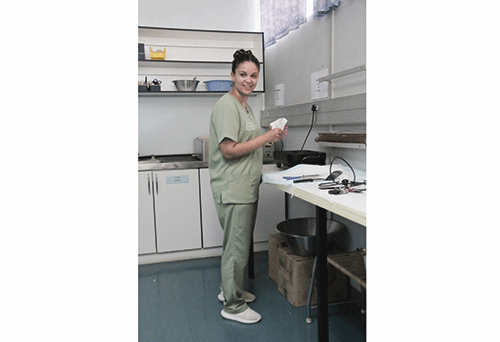Lahja Nashuuta
Patricia Pretorius works as an occupational therapist (OT) at Windhoek Central Hospital.
She deals with patients overcoming everything – from sustained spinal cord injuries and strokes to attention deficit disorder, amputees or recently-disabled individuals to regain function and independence.
She obtained a degree in OT from Stellenbosch University in 2020.
She initially wanted to opt for radiology, but her love for OT kicked in while she was in grade 12 when her class took a tour of the Windhoek Central Hospital’s Occupational Therapy Centre.
As a senior OT, Pretorius’ daily routine includes assessing the physical, psychological and social functions of the individuals referred to the OT centre by the doctors and their families.
She identifies areas of dysfunction, and involves the individual in a structured programme of activity to overcome disability.
The activity selected will relate to the patient’s personal needs, and reflect the environmental factors that govern his or her life.
“What we basically do here is offer key services, including fall prevention, wheelchair seating assessments, the provision of daily living equipment, cognitive intervention and rehabilitation,” she said.
She is also responsible for supervising OT interns and students, ensuring they receive the necessary input and training to help them give the best treatment possible.
Pretorius is an infant in public service. She joined the public service in 2021 to secure a position soon after graduating.
Questioned about why she opted for the public service and whether it was his dream to work for the government, she said, “When I started studying, the aim was always to return home and work in the public sector. During our studies, we were exposed to government facilities [in South Africa]. I had so much satisfaction assisting those and knew the satisfaction would multiply tenfold when given the experience to serve my fellow Namibians,” she said.
According to her, to serve in public service is “the ability to genuinely serve the Namibian public. I also really enjoy the wide variety of conditions we see, which are often limited in other sectors. This ensures that I am always doing research to provide the best care I can”.
Rewards
Pretorius said OT requires unequivocal dedication, and often rewards its practitioners with a tremendous sense of accomplishment.
“OTs must be compassionate, caring, patient and capable of commanding the respect and trust of people within their care,” she said.
“The satisfaction you get from helping someone reclaim their life is enormous. Sometimes they come in depressed and angry – and gradually, their spirits are renewed with each day of therapy. Hope and their future is in their eyes,” she enthused.
There is no job without challenges.
This is a reality Pretorius is aware of.
According to her, OT is often emotionally draining and backbreaking.
“Practitioners are challenged to develop and implement exercises that will gain the maximum participation and interest of patients,” she said.
She further said OTs face significant challenges when dealing with patients with permanent physical disabilities, such as muscular dystrophy, cerebral palsy or spinal cord injuries.
“They develop and teach patients how to operate adaptive equipment, such as wheelchairs, splints and other devices that allow individuals with limitations to exercise a measure of control over their environment,” she continued.
Pretorius also revealed that OTs who work with the physically disabled must have strength, agility and stamina to help patients in and out of beds and wheelchairs, as well as allow them to lean on them while they assist them with various activities, such as getting dressed or gardening.
“Due to my nature, I believe I need to always give the best input. With the State setting, I find it difficult to juggle my time to make sure I am satisfied with the treatment I give while still being able to attend to everyone I need to,” she said.
“As an OT, we always celebrate the small wins. That includes being able to wash your face or eat by yourself (as some of us really start from not being able to do that anymore). So, just empowering someone to be able to do something by themselves that they were unable to do and seeing that smile makes it all worth it,” she said.
Asked to share some of the work-related accomplishments or memorable moments she is proud of as a public servant, Pretorius had this to say: “I have played a role, together with an amazing team, to raise awareness for wheelchair users. We have established an annual wheelchair dexterity challenge (held in March).
During this challenge, we ask able-bodied people to have a roll in their wheels, completing obstacles while having fun. Another big accomplishment for me could be something small for others. But looking at the small wins, often our service users really come from very adverse backgrounds, and having that elderly lady or man look at you and say, ‘I really don’t have much for my child, but I want to tell you I appreciate what you did for me’. That really warms my heart and keeps me going,” she said.
Pretorius does not have any plans to leave the public service anytime soon.
“I feel that I have grown tremendously in the short time I have been a civil servant, and I am excited to see where that leads me,” she said.
Her wish is to see the OT profession grow and become a more well-known discipline in the homes of many.
“I think we provide such a unique perspective on assisting people with a wide variety of conditions and disabilities. I usually say when you need to ask, ‘can OT assist with this’, the answer is ‘yes, we can.’”
-lnashuuta@gmail.com


